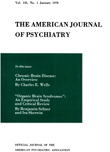NEUROPSYCHIATRIC PROBLEMS AT AN ALEUTIAN POST
Abstract
1. A series of 325 neuropsychiatric disorders studied at an Aleutian post is presented and discussed from the standpoint of etiology, incidence, reaction types and treatment.
2. Though combat was not a factor in precipitating or reactivating neurotic syndromes in this particular locality, other less tangible external factors played a decisive role in the production of neuropsychiatric disability.
3. Of the psychoneurotic patients, 80% gave a history of clear-cut symptoms before entering the service.
4. Psychoneuroses made up over 50% of the cases.
5. Some of the psychoneurotic reactions in these men who were not in combat were similar to cases reported in the literature as "battle neurosis" and "combat fatigue."
6. Psychoneurosis, dementia precox and miscellaneous disorders are illustrated by case histories. Certain problems in dealing with these disorders are discussed.
7. The general problem of disposition and treatment is presented, emphasis being laid on mental hygiene. Roughly 75% of the psychoneurotic soldiers were kept on duty status. One-third of the total neuropsychiatric cases were evacuated.
Access content
To read the fulltext, please use one of the options below to sign in or purchase access.- Personal login
- Institutional Login
- Sign in via OpenAthens
- Register for access
-
Please login/register if you wish to pair your device and check access availability.
Not a subscriber?
PsychiatryOnline subscription options offer access to the DSM-5 library, books, journals, CME, and patient resources. This all-in-one virtual library provides psychiatrists and mental health professionals with key resources for diagnosis, treatment, research, and professional development.
Need more help? PsychiatryOnline Customer Service may be reached by emailing [email protected] or by calling 800-368-5777 (in the U.S.) or 703-907-7322 (outside the U.S.).



